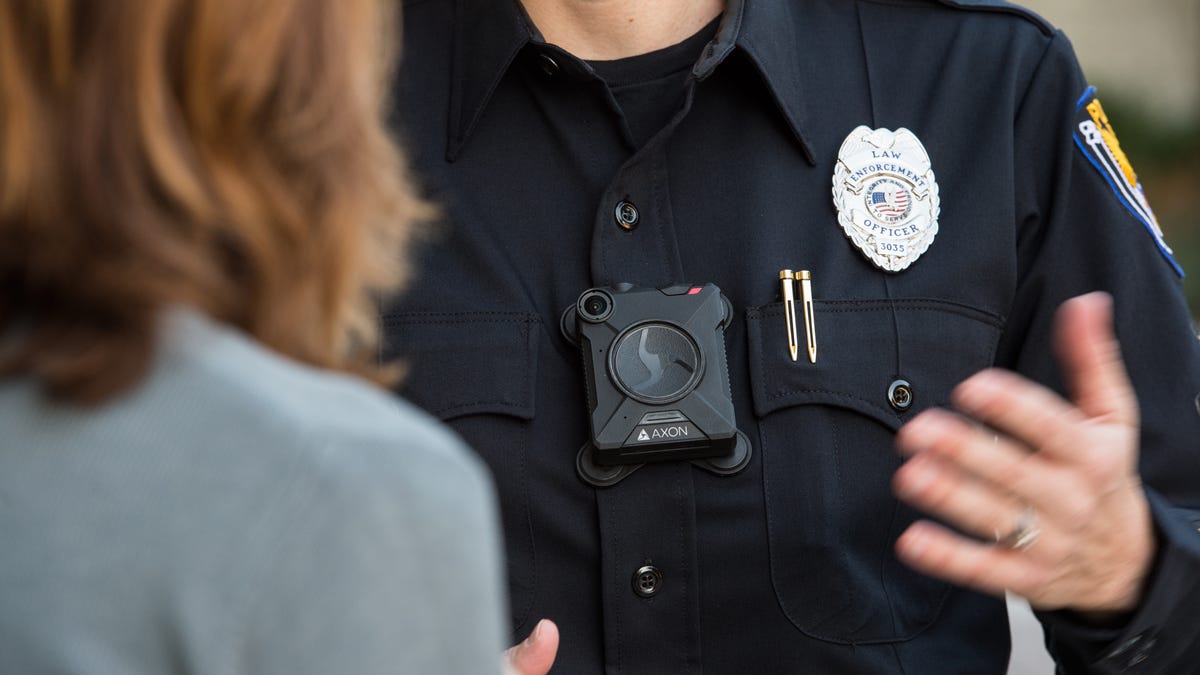Police hear a pitch for free body cameras, with a side of AI
The more cops use bodycams, the better artificial intelligence will get at recognizing faces and arrest footage.

Axon, which changed its name from Taser, is offering every police department free body cameras.
Nearly a half-million body cameras are now ready and waiting for police officers to wear them.
And those cameras won't just be recording what the cops do. They'll also be helping artificial intelligence get smarter.
Axon -- you used to know it as Taser -- announced Wednesday that it's offering body cameras for free to all police departments in the US for up to one year. If officers opt in for Axon's data collection, the company will get much-needed data to build its artificial intelligence program.
That'll be yet another step in the march of progress for AI, which is infiltrating seemingly every job, from insurance agent to bartender. Body camera makers such as Axon and Vievu want to let machines sort through vast amounts of video so police officers can spend less time behind computers. The AI systems would learn to recognize faces, weapons and voices, transforming tedium into an automated process.
How tedious? Axon manages about 6,000 terabytes of video from its offices in Seattle, and the process of storing footage, making clips and redacting faces currently drags on and on -- for instance, it can take four hours of work for a police department to release an hour-long video. That would be streamlined through AI's machine learning capabilities -- essentially, the software gets better and better at teaching itself, the more data it works through.
What's a better data pool than up to 500,000 officers using body cameras on the streets, at traffic stops and making arrests?
"Doing it in scale is really hard and expensive, but we made that investment," said Rick Smith, CEO of Axon, which on Wednesday changed its name from Taser to reflect its focus on body camera technology. "We are going all in. If the NYPD wants 35,000 cameras for a year, they can get them. There's no limit on how much data they can record."
Police departments would get the body cameras for up to one year, along with software, storage, training and tech support for the equipment. Part of the offer requires that every camera given out has to be used. The data would remain private to the police departments, which would have complete control of the machine learning process.
It would take a year for the company to send out 500,000 body cameras, but Axon said it has been preparing for the rollout since last October.
Body cameras have become essential equipment for police officers, nearly as important as their guns and badges. They've protected officers by providing evidence in cases, but also held police accountable in the public eye by showing cases of abuse of power.
Although 95 percent of police and sheriff's departments in major cities and counties plan on giving officers body cameras, in 2013 only 32 percent of police departments were using them, according to the Bureau of Justice Statistics.
The slow adoption pace hasn't helped Axon's efforts to improve its body cameras. In February, Axon bought AI startup Dextro to help automate law enforcement footage analysis. It's still in its early research and development stages.
"The real challenge is that this is a data problem much more than a hardware problem," Smith said. "This is a massive amount of information compared to any IT department you would find in a police agency."
While the body camera's hardware remains important, software has become the latest race with policing technology. A Department of Justice study found an increasing number of body cameras with facial recognition capabilities, and predicts that will grow. Vievu announced on Tuesday it is partnering with AI company Veritone to improve its algorithms.
Police need to review body camera footage to blur out faces of people in the background, create transcripts and create clips before releasing the material to the public. With machine learning, the body cameras would be capable of facial and object recognition, along with analyzing sentences, Veritone CEO Chad Steelberg said in a statement.
Veritone has already analyzed millions of hours of audio and video data, including from law enforcement agencies, and continues to extract "valuable metadata and intelligence" from body camera feeds to improve its artificial intelligence.
What are the odds of police departments looking favorably on Axon's offer? The general trend is in the right direction.
Cops have started warming up to body cameras, with the footage mostly being used to clear their case when people make public complaints, according to Terrence Cunningham, deputy executive director of the International Association of Chiefs of Police. He sees 75 percent of the nation's police using body cameras by 2027.
"I have seen a shift in the attitude [...] where they're not just embracing the use of the cameras, but requesting their own if the department doesn't have them," Cunningham said.
Axon's Smith doesn't expect every police department to accept his company's offer, but he believes people will change their minds as the technology improves.
"Body cameras to a cop is like a smartphone to everyone else," he said. "We didn't think we needed it until we got one."
Virtual reality 101: CNET tells you everything you need to know about what VR is and how it'll affect your life.
CNET Magazine: Check out a sampling of the stories you'll find in CNET's newsstand edition.

